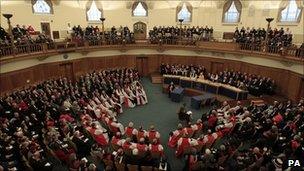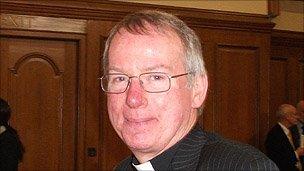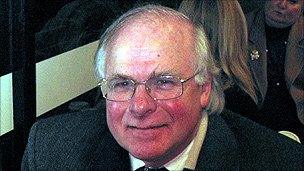Women bishops law faces its toughest test
- Published

The whole feel of the new General Synod is different, says Reform's Rod Thomas
The Church of England's new General Synod, which convened this week, will be the one which sees the law to allow women bishops meet its toughest challenge.
Opponents say the synod elections have gone their way. They want the male bishops appointed to care for them to be more autonomous, and say chances of the law getting through as it stands are slim.
If a majority of the Church's 44 dioceses approve it, the law will come back to the General Synod in 2012 - and will need two-thirds majorities in each of the synod's three houses.
"The whole feel of this synod is different," said the Rev Rod Thomas, chairman of the conservative evangelical group Reform, after the first debates of the new assembly.
He says evangelicals opposed to the women bishops law have done very well in the elections. "We've done much better in the House of Clergy than we ever thought we would."
Father Simon Killwick, who leads the Catholic group in the General Synod, says he thinks his group has "held its own, maybe gained one or two seats".
But the Rev Hugh Lee, convener in the General Synod for Watch (Women and the Church), the best-known group campaigning for women bishops, is sceptical.

There is a real possibility that if it is not amended the law could fail, says Father Killwick
The vote on the law is two years away, he says. "I think it will be close... but it's far too early to say how easy or difficult it's going to be."
Society formed
As the search resumes for a solution which pleases both sides, some Anglicans hope that two 7th Century saints, key figures in the unifying Synod of Whitby in 664, could help.
In September, a group of Anglo-Catholic bishops opposed to the women bishops law announced the founding of the Society of St Wilfrid and St Hilda, which is open to Anglican clergy and laity.
It aims "to provide a place within the Church of England where catholics can worship and minister" without accepting innovations including women priests and bishops.
Its supporters hope the society can be granted official permission to appoint male bishops acceptable to Anglo-Catholic parishes. Evangelicals opposed to women bishops have discussed forming a society of their own.
Of the new society, Father Killwick says he was very glad when he heard of the proposal in the summer.
It need not be seen as a slight to women diocesan bishops, he says - since it could exist in all dioceses, whether headed by men or women.
"Although we know where we have to go we have not found a way of doing it and the one mechanism that was not thoroughly explored... was the idea of a society," says Rod Thomas.
But he warns that it would not be good enough for a diocesan bishop simply to delegate powers to the bishops of a society.
If a female bishop of his diocese were to say "'the bishops of the society are welcome to come and minister at your church, Rod... and they do so with my episcopal permission and blessing', I would want to say that doesn't really do the job for me.
"Any form of delegated authority would be unacceptable - that involves tacit acceptance of the headship of a female bishop, that is the very thing that's causing the problem in the first place."
Remote prospect
Hugh Lee of Watch says of the societies plan: "Potentially there are ways in which it could work - none of us want it to be a ghetto, but really some sort of association of the few parishes that feel like that is a good idea." But he does not think it feasible to put the societies into the legislation.
With the prospect of compromise as uncertain as ever, only the House of Bishops can now amend the legislation before it returns to the General Synod.
The bishops will have to "weigh up the real possibility that if it's not amended the whole legislation might be defeated," says Father Killwick.
The society proposal, if it is worked out constructively in amendments to the legislation, "could actually then enable the whole Church of England to move forward", he adds.

Hugh Lee says the Church risks looking "antediluvian" if the law does not pass
All sides think the failure of this General Synod to end the women bishops conflict would be very bad for the Church.
If the law passed as it stands, says Father Killwick, "I'd certainly have to consider my position as to whether I could continue in the ordained ministry of the Church of England."
If it fails, says Watch's Hugh Lee, "I know a lot of people who say 'If it does fail I would give up on the Church of England - I'll go and join the Methodists, or be a Christian without being part of any Church'... and not just women: people like myself would ask if it is worth staying any longer.
"The stakes are high - we hope for it not to be that sort of all or nothing debate."